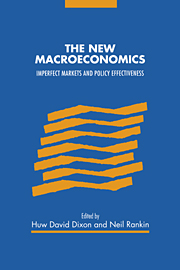Book contents
- Frontmatter
- Contents
- List of contributors
- Preface
- Acknowledgements
- Introduction
- Part I Overviews and perspectives
- Part II Goods market imperfections
- Part III Labour market imperfections
- Part IV Financial market imperfections
- Part V Nominal rigidities and bounded rationality
- 13 Hedging, multiple equilibria and nominal contracts
- 14 Information acquisition and nominal price adjustment
- 15 Expectation calculation, hyperinflation and currency collapse
- 16 Menu costs and aggregate price dynamics
- Bibliography
- Index of authors
- Index of subjects
15 - Expectation calculation, hyperinflation and currency collapse
Published online by Cambridge University Press: 13 October 2009
- Frontmatter
- Contents
- List of contributors
- Preface
- Acknowledgements
- Introduction
- Part I Overviews and perspectives
- Part II Goods market imperfections
- Part III Labour market imperfections
- Part IV Financial market imperfections
- Part V Nominal rigidities and bounded rationality
- 13 Hedging, multiple equilibria and nominal contracts
- 14 Information acquisition and nominal price adjustment
- 15 Expectation calculation, hyperinflation and currency collapse
- 16 Menu costs and aggregate price dynamics
- Bibliography
- Index of authors
- Index of subjects
Summary
Introduction
Economists widely agree that inflation expectations play a crucial role in hyperinflationary episodes. There is little agreement, however, on how these expectations are formed, and two competing approaches to the question of expectation formation have emerged. On one hand, the rational expectations approach posits that agents base their expectations on full knowledge of the structure and equilibrium of the economy. On the other, the passive adaptive learning approach endows agents with simple learning rules that map past inflation observations to future forecasts, with the form of the mapping incorporating little direct information about the structure of the economy.
Each of these approaches faces difficulties from both conceptual and empirical standpoints. The rational expectations approach (for example, Sargent and Wallace, 1987) gives no account of how agents come to acquire rational expectations, and in particular there is no specification of what agents would believe were they to observe a history that violated rational expectations. For models with multiple rational expectations solutions, the approach faces the problem of selecting among the (possibly infinite) set of equilibrium paths. Empirically, it is difficult to reconcile rational expectations paths in the paradigm hyperinflation model with the historical record, which shows hyperinflations to have involved increasing and accelerating inflation rates, terminating in major fiscal restructurings or ‘currency collapse’. Finally, there are problems in reconciling the rational expectations approach with experimental results.
- Type
- Chapter
- Information
- The New MacroeconomicsImperfect Markets and Policy Effectiveness, pp. 307 - 336Publisher: Cambridge University PressPrint publication year: 1995
- 4
- Cited by



